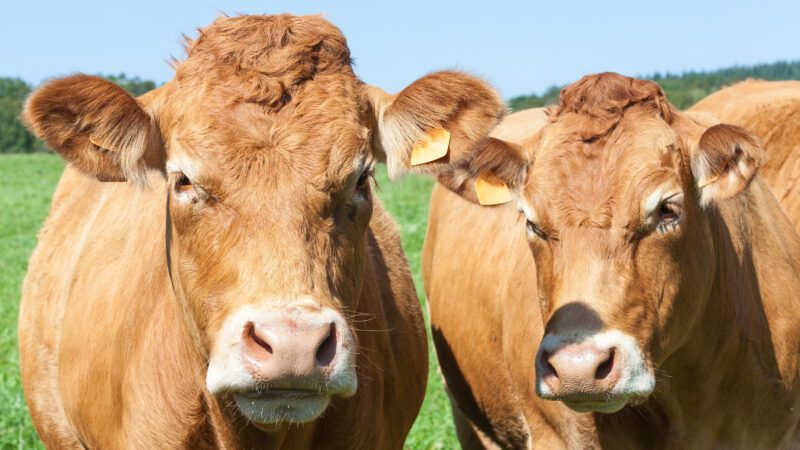It's Time To Kill the Mandatory Beef Tax That Underwrites "Beef, It's What's for Dinner"
The beef checkoff problem raises prices without benefiting ranchers

A group of farmers and ranchers has asked the U.S. Department of Agriculture to reform or end the agency's moronic beef "checkoff" program, which raises the price everyone pays for beef so that we may be subjected to those "Beef, It's What's for Dinner" ads, the Associated Press reported last month. The petition, which was due to the USDA this week, asks the agency to put the checkoff to a vote of the producers subject to the program.
The petition was organized by the group R-CALF, which represents the nation's independent cattle producers. R-CALF complains that most of the funds from the checkoff program find their way to the National Cattlemen's Beef Association (NCBA), which represents many of the nation's largest beef producers.
"Today, when you buy a Big Mac or a T-bone, a portion of the cost is a tax on beef, the proceeds from which the government hands over to a private trade group called the National Cattlemen's Beef Association (NCBA)," Washington Monthly reported in 2014. "The NCBA in turn uses this public money to buy ads encouraging you to eat more beef."
R-CALF's petition, which received more than 19,000 signatures, explains why the 35-year-old checkoff program doesn't work for its members, including that those who administer the program are unaccountable, that the program has suffered from corruption, and that the program stifles farmers' and ranchers' ability to engage in "robust competition, liberty, and freedom to operate as they see fit."
As I explain in my 2016 book Biting the Hands that Feed Us, USDA "checkoff" programs exist for not just beef, but also pork ("Pork. The other white meat."), dairy (milk mustache), and other foods.
While the USDA claims the antiquated, mandatory collectivist marketing approach empowers businesses, as I explained in a 2017 column on legal challenges to the beef checkoff program, these programs cost farmers and ranchers around $750 million each year. That's a lot of unwanted coin to drop in order for the government to "empower" you.
While meat prices have risen steadily since the start of the pandemic, most farmers and ranchers haven't seen their share of that pot grow. That's one reason the Biden administration is blaming the nation's so-called "Big Four" meat processors for the rising prices. It also explains, in part, why R-CALF is pushing the USDA to end the checkoff program.
But the group's chief complaint with the program is that its members are paying for USDA promotion, the Associated Press reports, "at a time when imports are flooding the market and plant-based, 'fake meat' products are proliferating in grocery stores."
Checkoff programs are an expensive, pointless, and unconstitutional imposition on the rights of farmers and ranchers to market their food as they see fit. Marketing beef, of course, is not a problem—no more than, say, marketing soap is a problem. If some ranchers choose to band together and buy ads touting the awesomeness of their meat on their own time and dime, there'd be no issue. But that's not how the checkoff program works. Rather, the problem with the beef checkoff is that it's a mandatory program that forces ranchers to participate and raises prices for consumers.
On top of that, they must participate whether or not they want or receive any benefits from the checkoff. Most don't. Writing about a checkoff program in Biting the Hands that Feed Us, I note that "if there are any benefits to be had from [checkoffs], they aren't likely to be enjoyed by you or your local farmer." Indeed. R-CALF's petition could be an important step toward ending the wasteful beef checkoff program, making beef what's cost less for dinner.


Show Comments (243)